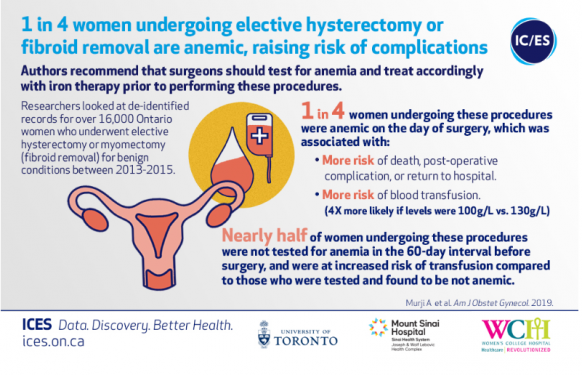New publications from Sinai Health experts

A recent study published by Dr. Ally Murji, gynecologist at Mount Sinai Hospital, in partnership with Women’s College Hospital, found that nearly a quarter of women who undergo an elective hysterectomy or fibroid removal for non-cancerous conditions are anemic, which increases their risk of complications like requiring a blood transfusion, infection or readmission into hospital.
“We need to better understand why one in four women arrive anemic on the day of surgery so that we can optimize surgical outcomes. Anemia is easy to diagnose, simple to treat for the majority of iron-deficiency anemia, and untreated anemia has consistently been shown to be associated with adverse outcomes,” said Dr. Ally Murji.
Researchers looked at data for more than 16,000 women in Ontario who had these elective procedures for benign conditions from 2013 to 2015.
The research was conducted through ICES, a non-profit research institute that uses population-based health information to produce knowledge on a broad range of health care issues and published in the American Journal of Obstetrics & Gynecology.
The Mount Sinai Hospital’s Placenta Clinic provides multi-disciplinary care to women with placenta accreta spectrum (PAS) disorders. This condition involves abnormal attachment of the placenta to the wall of the uterus, a complication of pregnancy that can be life-threatening due to increased risk of bleeding at the time of delivery. Recently, Sinai physicians published National clinical practice guidelines for this condition with an aim of increasing awareness and improving care for affected women. An image showing Placenta Percreta invading the maternal bladder (below), from a complex case of placenta previa seen in the clinic, was shared in the New England Journal of Medicine.













